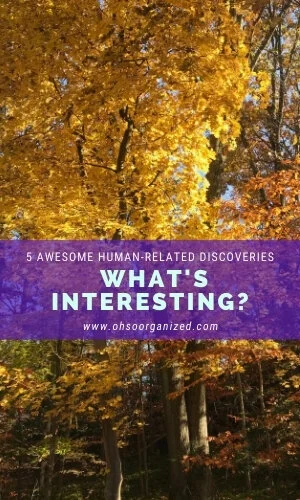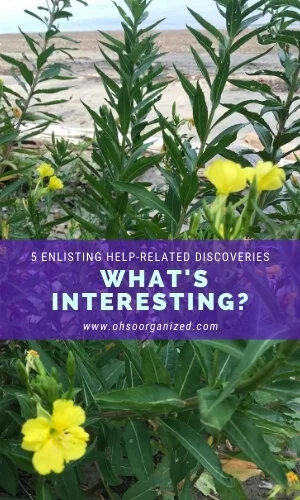The latest installment (v29) of the “What’s Interesting?” feature is here with my recent discoveries that inform, educate, and relate to organizing and life balance. I’ve included unique and inspiring, wonderfully human-related finds, which reflect this month’s blog theme. You are such a beautifully generous, warm, and engaged group. I am deeply appreciative and grateful for your presence, positive energy, and contributions to this community.
I look forward to your participation and additions to the collection I’ve sourced. What do you find interesting?
What’s Interesting? . . .
1. Interesting Read – Human Living
The pandemic encouraged many of us to examine the busyness of our lives. If you are interested in exploring a more intentional, less stressful life, this book is for you. In Slow - Simple living for a frantic world, Brooke McAlary, author, blogger, and podcast host, shares her inspiring journey to remove the excess in her life and embrace the Slow Living movement. McAlary says, “Slowing down and simplifying aren’t centered solely on the idea of decluttering, but letting go of excess is an important part of slowing down.” McAlary’s practical advice for simpler living includes identifying your why, decluttering, de-owning, mindfulness, balance, and backsliding. She reminds us that “Perfect doesn’t exist...What does exist is honest, human imperfect change. Every tiny step matters.”
“Perfect doesn’t exist . . . What does exist is honest, human imperfect change.””
2. Interesting Product – Human Habit
Wearing masks, social distancing, and regular handwashing are respectful habits we can do to keep each other healthy and safe during this pandemic. My wonderful friend and colleague, Julie Bestry, recently wrote a review of a fabulous new product, the Time Timer® WASH. Thank you, Julie! This visual and auditory timer helps kids and adults wash their hands for the proper amount of time. My favorite part about the timer is the upbeat music that accompanies the visual display. Think kitchen or bathroom dance party! The timer gives you 5 seconds to apply soap, 20 seconds to scrub your hands, and 5 seconds to rinse. The fun factor encourages a handwashing habit. Let’s do our part to help our fellow humans.
3. Interesting Research – Human Attention
Amishi Jho, the neuroscientist, author, and associate professor of psychology at the University of Miami, studies attention. Jho and her team research VUCA (Volatility Uncertainty, Complexity, Ambiguity,) which involves “high-stress, high demand scenarios that can rapidly degrade one of our most powerful and influential brain systems: our attention.” They look at people who encounter regular VUCA conditions due to their professions, such as firefighters and soldiers. She identified that the global pandemic has all of us living with VUCA conditions. In her recent Mindful article, “You’re Overwhelmed (and it’s not your fault,)” she describes ten ways your brain reacts in VUCA situations and how regular mindfulness meditation can be the key to calming your mind and enhancing your attention.
4. Interesting Article – Human Anticipation
Have you planned fewer (if any) events to look forward to this year because of pandemic restrictions? As a result, have you noticed a negative change in your mood? According to Dana Smith’s article, Your Brain Needs a Party, which was reprinted on the Brainfit blog, the anticipation of future events enhances your overall well-being. So if you, along with much of the country, have been feeling down, and our current situation continues to discourage having large parties or travel excursions experiment with “microdosing anticipation,” as Markham Heid suggests. Psychologist Christian Waugh encourages, “Instead of thinking big or way in the future, think smaller and closer in time.” For instance, how about planning a drive to explore local scenery, setting a date to Zoom with a treasured friend or family member, or planning a scaled-down Thanksgiving meal for your household pod. I see cranberry sauce and pumpkin pie in your future. Your brain’s “positive anticipation circuit” will reward you with the emotional boost you may be missing.
5. Interesting Thought – Human Acceptance
Life includes experiencing challenges big and small. We can be our biggest cheerleaders or worst critics when we go through struggles. Whether you are challenged by disorganization, learning difficulties, grief, or other issues, be kind to yourself. Accept your humanness. Reach out for help when you need it. And as Brene Brown says, let go of shame.
What are your interesting finds? Which of these resonate with you? I’d love to hear your thoughts. I invite you to join the conversation!





















